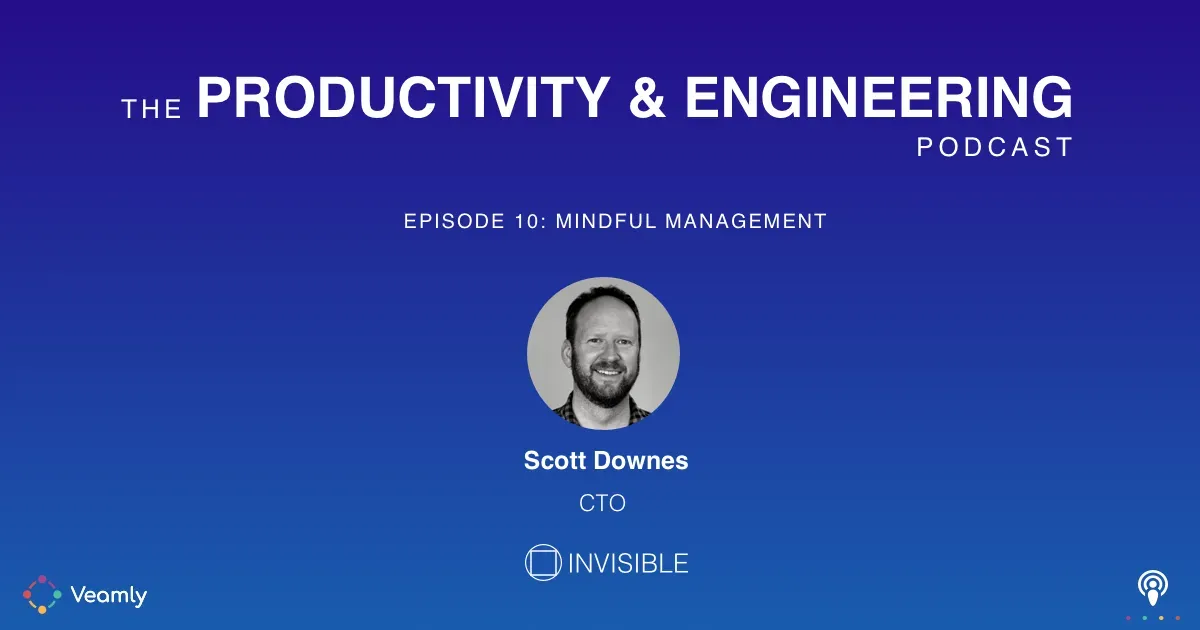
podcast
November 10, 2020The secret of becoming a mindful manager
Managing engineering teams effectively takes more than just meeting the expected deadlines.
To dig deeper, our CEO Emna Ghariani sat down with Scott Downes, CTO of Invisible Technologies to talk about mindful management, productivity and how to keep your engineering team on track especially in tough times.
As a veteran CTO, Scott Downes has built and led product, engineering, design, and marketing teams at multiple startups, most recently Invisible. Also served as CTO at Bellhop - a $50MM moving logistics and tech company. Scott is also an accomplished musician and a proud father.
Management differs at scale.
The challenges of managemùent varies with your team size. The same goes for its sensitivity, Scott explains:
"I think the things that have been interesting for me and kind of looking at leading a small team versus leading a large team is that there's a tendency for us those of us who are Engineers to kind of follow the same path, which is to say we start off passionate about building products and writing code. We really want to just be in that world where we put on headphones and and go off into that flow State and create amazing things and then you get good at it and people say hey you should be in charge and all of a sudden there's an entirely different skill set required when you're not responsible just for your own code, but responsible.
The code of your teammates and your your direct reports and then as you kind of follow you go up that ladder if you succeed inevitably you're going to get kind of pulled up the ladder even if you don't climb it all of a sudden you may find that you're doing a job that maybe that's not how you got into the why you got to the space in the first place, right? So I definitely had that experience myself when I found someone who's really passionate about building and creating that I suddenly was an administrator.
Where I was in a company anywhere, I had things all around the world working 24/7 literally and my job was to orchestrate and not as much to create. So we all have to kind of figure out what we're good at what we like what we're passionate about and for me, I found that there's a sweet spot of like growth stage startups where you're likely to be able to lead and make an impact. With the work that you do, but also you have enough scale that you're not doing things just purely by yourself in a room. So for me that space is like teams with hundred twenty or so Engineers. It's kind of a sweet spot for me a couple of product managers at design team get to the scale where you can actually change the world but not so much where you're kind running a factory. "
Software engineers are not just code monkeys
When you write code for a living, most people often forget the human element and the power of empathy. Scott emphasized that managing software engineers goes a long way in this direction:
"There was the 70s management theory that people bring all their flaws and defects and personal dramas into the workplace and they play them out. So that's how you can see like everything we've all seen this where you have like Manager or colleague who's yelling at people all the time and he's like why why is he doing that? What's really going on like there? It's easy for us as human beings to rationalize our behavior and say like, well, I am being a strong leader. When what you're really doing is being a jerk. There are plenty of situations where where that's really transparent and you know, some of us it's very easy, you can see that people might be Bring anger or sadness, whatever their emotions they come to work because we're human beings.
We bring the whole package, but I think what I've tried to think about as we talk about sort of like bringing the benefits of mindful practice into work is thinking about the positive aspects of our growth as individuals and not just the negative. So if you if you flip that theory on its head you might say that you know, as we grow as people as we learned to be at as an example for me as I learned to be a better father, I think Conform to my ability to be a better manager being kind of more patient and creating kind of a loving context in a relationship as a manager not just thinking of like being responsible for moving chess pieces on a board.
Parenthood has really informed way that I approach approach might like my own patients as a manager. We're in this together. I trust you and we're going to get there. That's kind of the prevailing narrative. but I think there's something else in there that I'm still trying to work through related to how we should. Observe our behavior and observed outcomes. Non-judgmentally. I think it resonates lot with kind of some of the principles of radical Candor and various kind of popular movements and how modern cut company cultures can be healthier, but I think it's not merely about being at peace and being non-judgmental. It's also about allowing yourself to be non-judgmentally. Yeah, it's not just feelings."
Listen to the full episode with our CEO Emna Ghariani on your favorite podcast platform
Thank you for the registration
You are now subscribed to our newsletter